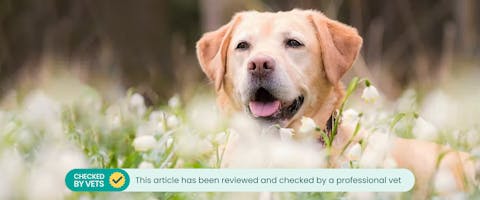Updated 01/09/2023
Blooming each year between January and March with their pretty, white bell-shaped flowers, snowdrops are a dead cert sign that spring has sprung, and - legend has it - signal new beginnings, hope, and better times ahead. Hear, hear!
However, if you’re a pet parent - namely, a pet parent in close proximity to a snowdrop flower - you may be wondering if they are safe around four-legged friends. So, are snowdrops poisonous to dogs, or not? Let’s find out.
Trending posts
Purr-use some of the top blogs our members have been loving this month- Top male dog names for your new furry friendGot a new furry family member in your pack? Check…

- Top female dog names for your new fluffy palWelcoming a new pooch into your family? Explore…

- 250+ gray cat names your silver feline will loveRecently welcomed a fluffy gray bundle of joy into…

- What are normal pet sitting rates?Discover the average pet sitting rates for animals…

- Unique dog names to stand out from the packDare to be different with our list of the best…

Are snowdrops toxic to dogs?
Yes, snowdrops are toxic to dogs. All parts of the plant - including the bulbs, stem, and leaves - contain phenanthridine alkaloids, which can cause gastrointestinal issues if eaten, along with a wide range of unpleasant symptoms for pets - from vomiting and diarrhea to seizures, incoordination, and more.
Are snowdrop bulbs poisonous to dogs?
Yes - while all parts of the plant are poisonous to dogs, snowdrop bulbs are the most toxic as they contain the highest concentration of phenanthridine alkaloids. Avoid at all costs!
If you have any suspicions that your pet may have eaten any part of a snowdrop, it’s recommended to contact your veterinarian immediately for advice.
Snowdrop poisoning in dogs
Symptoms
The severity of symptoms can vary, depending on which part and how much of the snowdrop plant was eaten. Eating the bulb poses the biggest risk, but be aware that all parts of the plant are considered toxic.
According to the Pet Poison Helpline, the main symptoms to be aware of include:
- Drooling
- Vomiting
- Abdominal pain
- Diarrhea
- Incoordination
- Drop in blood pressure and heart rate
- Seizures
If you suspect your pet may have eaten snowdrops, contact your local veterinary clinic immediately. It’s important to remember that your pet may not start showing symptoms until it is too late. Getting prompt veterinary attention for your pet will give them the best chance at making a recovery.
Related article: Are Dog's Mercury (Mercurialis perennis) poisonous to dogs
Diagnosis
If you suspect your pet has eaten a snowdrop, contact your vet as soon as possible for advice. If you've caught your pooch eating a flower but you're not quite sure what the flower was, take the plant/flower along with you to the vet to help aid in diagnosis and speed up your pooch's treatment plan.
As well as a physical examination, it's possible that at this stage, your vet will order a course of blood tests and urinalysis to confirm the diagnosis and check your dog’s vitals. These blood tests can check body systems such as kidney and liver function. Your veterinarian can discuss with you how best to investigate in your pet’s individual case.
Treatment
While only your vet will be able to tell you the exact course of treatment recommended for your pooch, in most cases, vomiting will be induced to rid the toxins from your dog's system and prevent further absorption. It’s extremely important not to attempt to induce vomiting at home. Doing this puts your pet at a very high risk of choking and can cause further complications. Activated charcoal is often administered at this stage to help further absorb as much of the remaining toxins as possible. For more severe cases, for example, where a large amount of the plant has been consumed (or in cases where a longer period of time has passed since your pooch ate the plant in question), further treatment - such as gastric lavage - may be required, and IV fluids (a drip) may also be prescribed to prevent dehydration and aid recovery.
Your veterinarian will discuss the best treatment plan for your pet.
Meet our veterinary expert, Evie
This article has been checked by veterinarian Evie Moloney RCVS. Evie is a vet surgeon who graduated from the University College Dublin, which is the only university offering the veterinary medicine degree in Ireland. She really enjoys surgery and has also worked as an emergency and critical care vet. She is passionate about sharing education about preventative health care
for pets, especially the importance of regular dog and cat teeth brushing at home. She also enjoys helping owners find practical solutions for keeping pets as comfortable as possible while living with conditions such as arthritis. When not working, she enjoys hiking and swimming.
Other plants that are poisonous for dogs
What other plants are poisonous to dogs? Unfortunately, there are plenty more plants and flowers that our pups should avoid - here are just a few to get you started:

